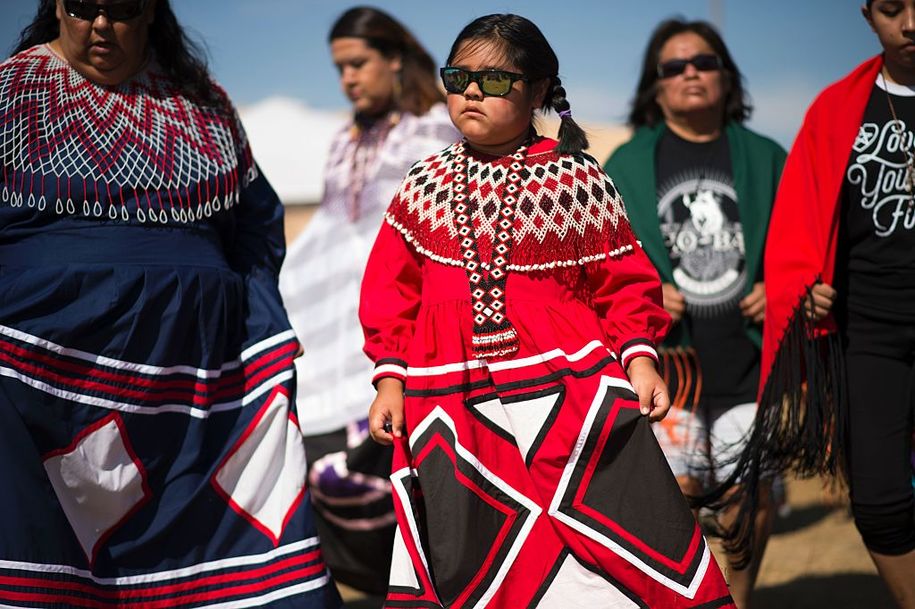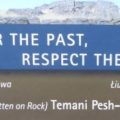 Women and girls from the Colorado River Indian tribes dance after arriving at a protest encampment near Cannon Ball, North Dakota, to lend their support to the Standing Rock Sioux Tribe’s opposition to the Dakota Access Pipeline (DAPL).
Women and girls from the Colorado River Indian tribes dance after arriving at a protest encampment near Cannon Ball, North Dakota, to lend their support to the Standing Rock Sioux Tribe’s opposition to the Dakota Access Pipeline (DAPL).
The Upper Skagit Tribe has been in Washington for centuries. In 1855, it struck a deal with the U.S. government, trading its lands for “$150,000 and other promises,” as Justice Neil Gorsuch wrote in Monday’s opinion in Upper Skagit Indian Tribe v. Lundgren et vir.
Originally rendered nearly landless, the Tribe has acquired more than 500 acres since 1981, some of which is held in trust for the Tribe by the U.S. government. In 2013, the Tribe purchased a 40-acre plot located on ancestral land near land held in trust. Because of its proximity, that land is a strong candidate to become trust land. For that to happen, the Tribe had to commission a survey. The survey found the plot an acre short: A 1,300-foot barbed wire fence blocked off access to an acre that neighbors Sharline and Ray Lundgren claimed as their own.
After the tribe conveyed that it would be reclaiming its acre and building a new fence, the Lundgrens filed a quiet title action, asking a court to declare that the acre was theirs, “quieting” other claims. Their arguments? Adverse possession (c’mon guys, it’s been this way for a long time) and mutual acquiescence (the guy who owned this property before the tribe didn’t mind us taking his acre).
The tribe’s brief points out that its sovereign immunity “is a matter of federal law.” That principle was clearly established in a 1998 decision, Kiowa Tribe v. Mfg.Techs., Inc. Tribes have sovereign immunity; there’s no waiver of sovereign immunity in the absence of express language. The same case declares that “the immunity possessed by Indian tribes is not coextensive with that of the States.”
The Lundgrens, meanwhile, relied on a Supreme Court decision they claimed established that a state court could enforce law with respect to property owned by a tribe (in rem), just not the tribe itself (in personam), despite the assertion of sovereign immunity. In other words, the Lundgrens could not sue the tribe, but their action to claim tribal property under Washington state law was a-okay.
The Washington Supreme Court agreed with them. Gorsuch did not. Rather, he quoted their finding and noted simply, “That was error.” The majority clarified that Yakima cannot be used to abrogate tribes’ sovereign immunity. The case now returns to state court for consideration of the Lundgrens’ secondary, common law argument.
Gorsuch claims the justices opted for remand because the Lundgrens’ fallback argument was belatedly introduced in an amicus brief from the U.S. government. That’s probably not the full story; Gorsuch likely wanted to go farther, ruling that there’s no abrogation of tribal sovereign immunity for a fee land purchase within a tribe’s reservation. That would mean tribal land is tribal land, as protected as the tribe itself.
Lacking five votes for the right course, Gorsuch opted to assemble a seven-justice majority for the next best option. Which is, to be clear, a big, big deal. It is a procedural win for the tribe, and a victory that resolves a subject of contention in the lower courts in favor of tribes, opening the door for litigation.
Bigger yet? It signals a potential shift for the Supreme Court toward protecting tribal sovereign immunity. The anti-tribe block, as a friend who practices Indian law describes it, has had six votes for a while, sometimes seven. That Gorsuch managed a seven-justice majority is spectacular. Especially given his reputation for clashing with his colleagues.
The ruling bears on Washington’s second Indian law case before the Supreme Court this term. The same Indian law expert offered delicately, “Washington is fucked in the culverts case.”
One sour note: Chief Justice Roberts’ concurrence.
Roberts stated, “[t]he correct answer cannot be that the tribe wins no matter what; otherwise a tribe could wield sovereign immunity as a sword and seize property without impunity, even without a colorable claim of right.”
That’s an astonishing sentence even in a maddening concurrence. There’s no potential for tribes to effect seizure; only reclamation of lands rightfully theirs.




Leave a Reply